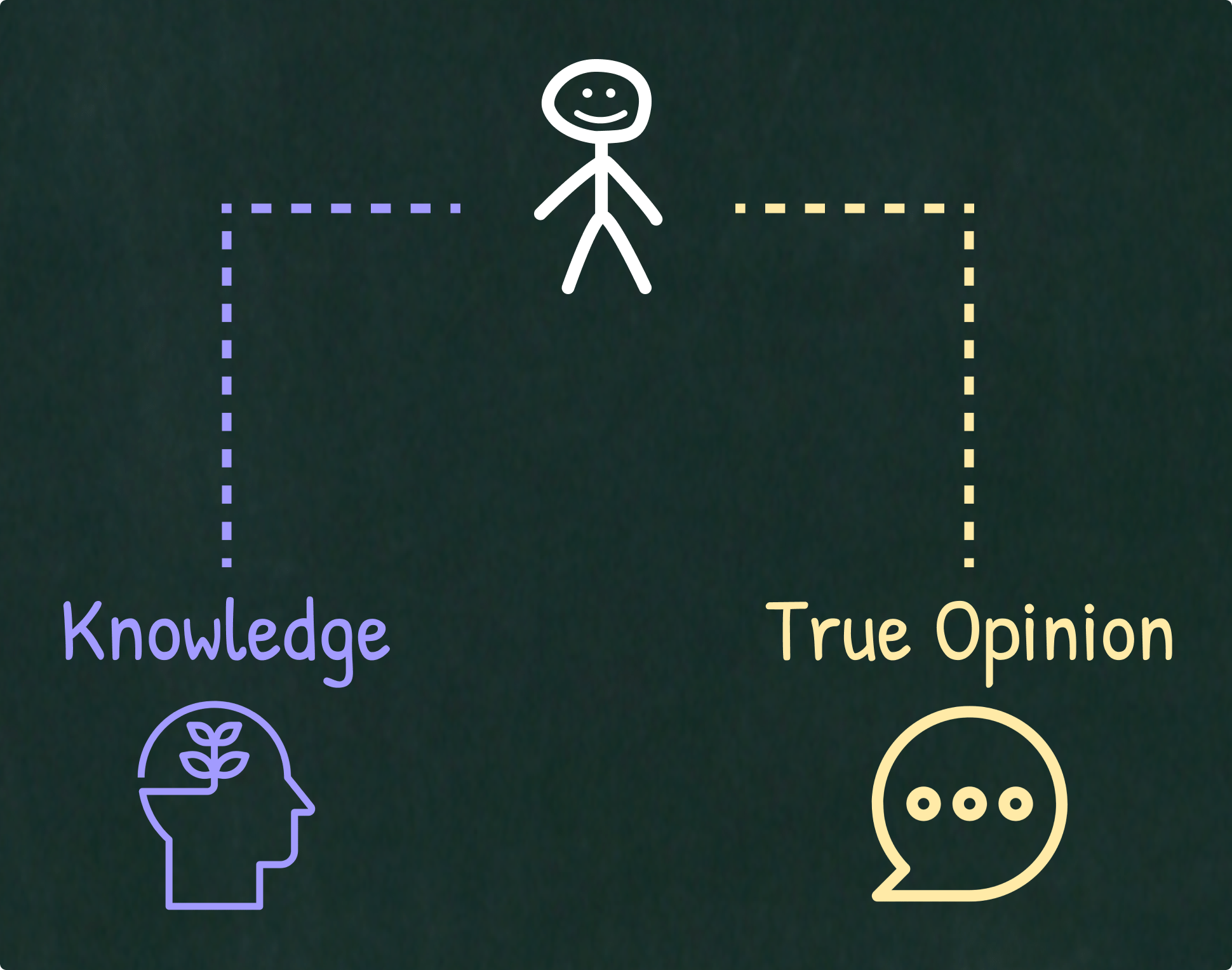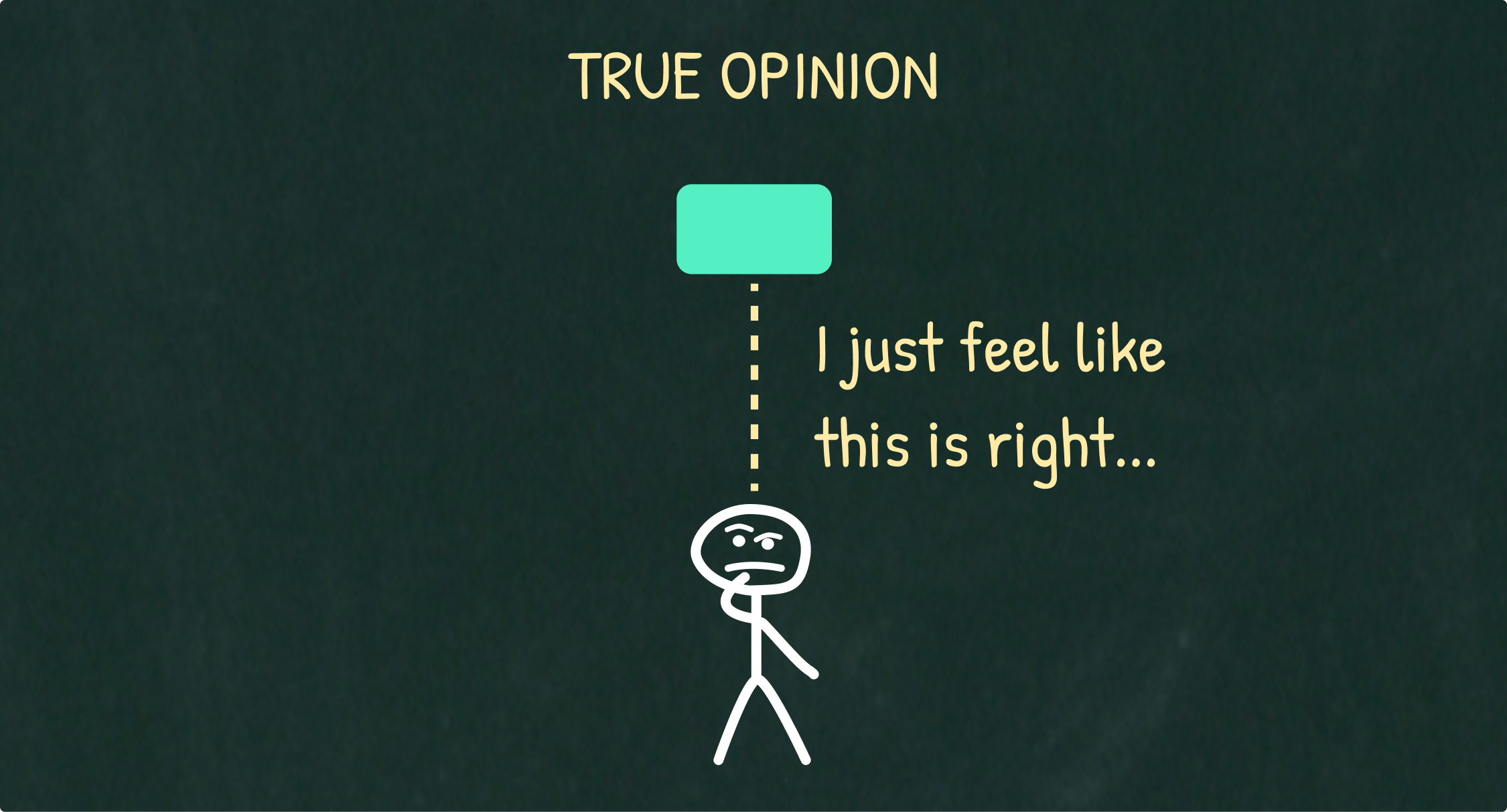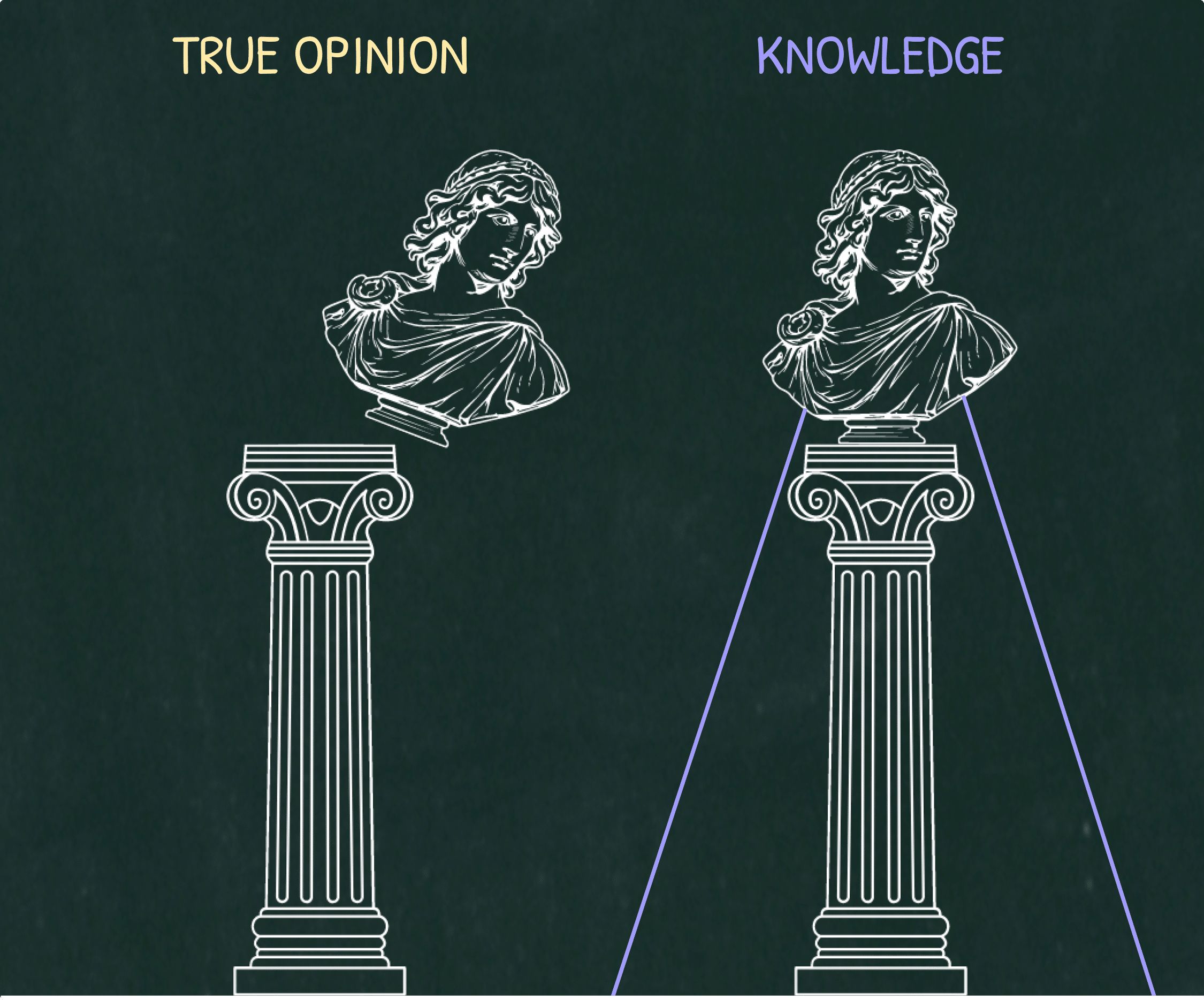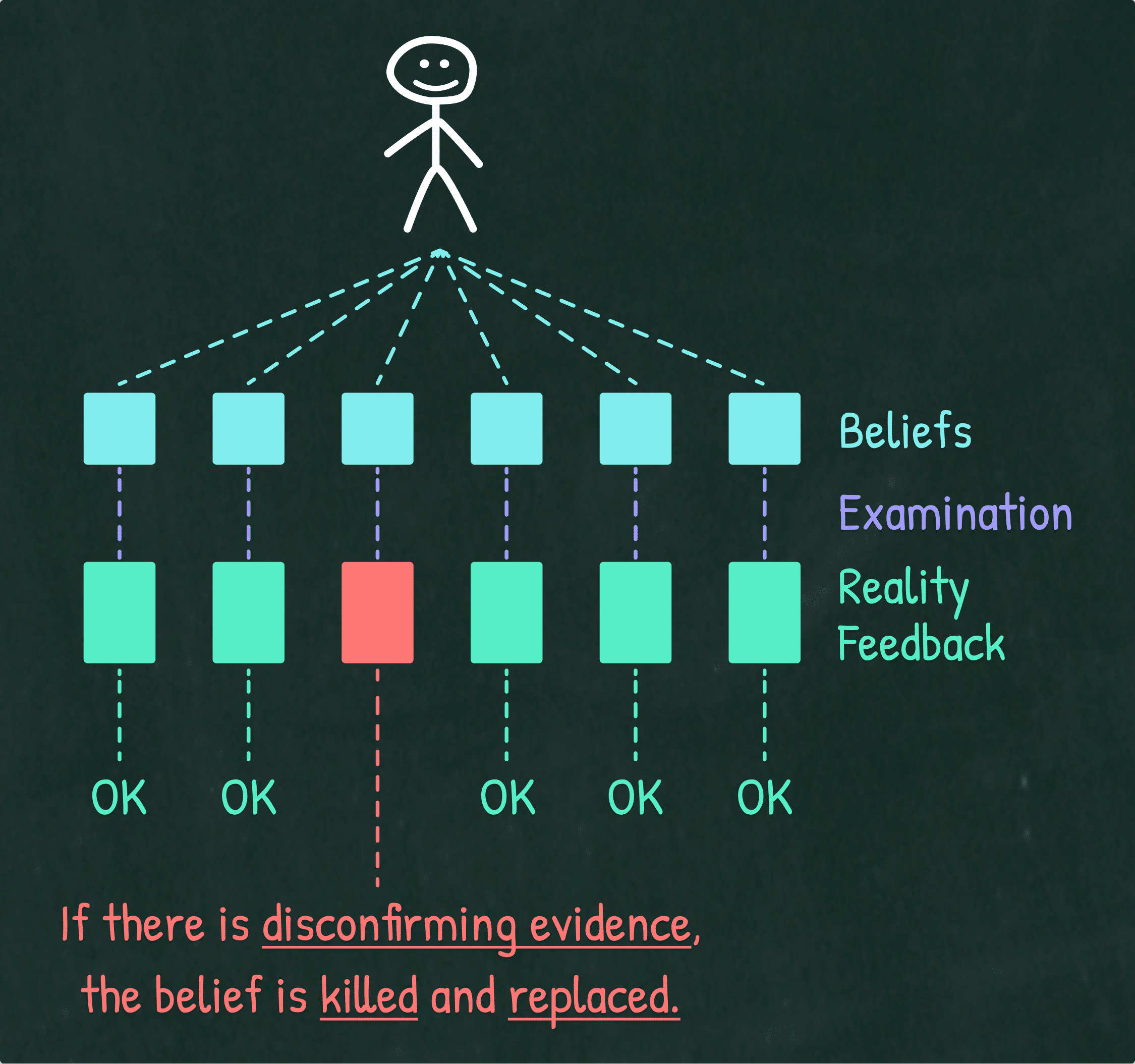Table of Contents

How do you become more confident and courageous in your beliefs and objectives—especially when confronted with an opposing viewpoint?
To say this another way, “what important truth do very few people agree with you on?” as Peter Thiel famously posited in Zero to One?
Spoiler alert: Thiel’s question is Socratic in nature. But what does that even mean? And what does Socrates have to teach us about one’s “true opinions” vs. knowledge, especially in the age of the self-created echo chamber known as social media?
Let’s dive in.
What Is a True Opinion?
A “true opinion” is when you guess (or adopt from others) an idea or a belief that turns out to be correct, but that you haven’t deeply examined. So, you can’t rationally support your belief in the face of counter-arguments.

What Is Knowledge?
Knowledge is when you understand why something is true and why the alternatives and counter-arguments are false. So you can rationally defend your view on the issue.

Personally, to make sure I’m knowledgeable on something, I use this brilliant rule from Charlie Munger (Ex-Vice Chairman of Berkshire Hathaway):
I’m not entitled to have an opinion unless I can state the arguments against my position better than the people who are in opposition. I think that I am qualified to speak only when I’ve reached that state.
In other words, Charlie Munger won’t have an opinion on anything until he has reached a state of deep knowledge on the issue.
Interestingly, he applied this same philosophy to his investments — he would only invest in what he calls his “Circle of Competence,” which is the set of businesses that he fully understands (and thus he can rationally defend his investment against the “short-sellers” in that investment position).
Unfortunately, most people aren’t like Charlie Munger. In fact, the philosopher Bertrand Russell would argue most people couldn’t be farther from that state, captured in his quote:
Most people would rather die than think and many of them do!
As Alain de Botton (Founder of The School of Life) also mentioned: “The reason there are many imprecise ideas out there in the world is that many people imagine that you can come up with a good idea without thinking too hard about it.” [source]
Moreover, people who don’t thoroughly think about anything are more likely to lead lives based on what other people around them are doing because we’re memetic by nature as Rene Girard posited. Thus making their odds of living a free and interesting life very small.
No. If you think nothing through, it's easy to take whatever your tribe spoon feeds you.
— Naval (@naval) July 4, 2016
The Difference Between Knowledge and True Opinion
In his book The Consolations of Philosophy, Alain de Botton explains the difference between true opinion and knowledge based on Socrates’ philosophy:
Socrates described a correct belief held without an awareness of how to respond rationally to objections as true opinion, and contrasted it unfavourably with knowledge, which involved understanding not only why something was true, but also why its alternatives were false.
He likened the two versions of the truth to beautiful works by the great sculptor Daedalus.
[1] A truth produced by intuition [true opinion] was like a statue set down without support on an outdoor plinth. A strong wind could at any time knock it over.
[2] But a truth supported by reasons and an awareness of counterarguments [knowledge] was like a statue anchored to the ground by tethering cables.
Socrates’ method of thinking promised us a way to develop opinions in which we could, even if confronted with a storm, feel veritable confidence.

The Pursuit of Knowledge: Why We Should Pursue Knowledge
You might wonder what practical difference it makes to have a true opinion versus knowledge, since they both arrive at the same correct conclusion. But it does make a big difference. In fact, it makes a life-changing difference…
When you have a true opinion, you are only guessing. And if you follow this model of only guessing, odds are you’ll have many opinions that are actually not correct. As we saw previously, one can’t have good ideas without thinking hard about them and being able to adequately state the counter-arguments to their ideas.
Another big reason for why you should pursue knowledge is this: It will get you to live the life you truly want.
This happens because when you deeply examine your ideas and beliefs, you gain a clarity of mind about what you should do, why you should do it, and why you shouldn’t do other things.
On the contrary, people who stay shallow in their understanding of why they believe what they do risk becoming shallow themselves—confused about what to do and easily persuaded by others. So, if you want to live a good life, you must break out of this shallowness — by deep self-inquiring.
The unexamined life is not worth living.
– Socrates
[The Apology, by Plato]
Conducting self-inquiry into your own beliefs and counter-arguments to those beliefs, if done honestly and rationally, means you’ll become more confident in them. You’ll be more confident in their accuracy and you will understand why competing ideas are wrong.
Be a free thinker and don’t accept everything you hear as truth.
Be critical and evaluate what you believe in.
– Aristotle
And you will surely need this confidence because it takes courage to diverge from the crowd when you find inconsistencies in widespread statements, it takes both confidence and courage to do this. As Socrates points out, you shouldn’t worry about what the majority thinks; you should only worry about the reasoning behind their arguments. And once you understand the flawed reasoning, you free yourself to stop caring about what the majority does or thinks about a particular issue.
There was truth and there was untruth, and if you clung to the truth even against the whole world, you were not mad.
– George Orwell (English writer)
[1984]
Very smart people tend to be weird since they insist on thinking everything through for themselves.
— Naval (@naval) July 4, 2016
Why Only Individuals Can Search For Truth
You might think that if a lot of people believe in something, then it is likely to be true. But this is only a perception caused by the social proof bias. It has nothing to do with the actual truth. In fact, groups are more likely to be incorrect compared to individuals — because the survival of social groups does not depend on truth, but consensus.
What’s considered to be true is fought over. Individuals search for truth but groups search for consensus—and society is the largest group. So the biggest problem we run into is this: What society wants for you is not always what’s good for you.
Here’s a simple example: “Money won’t make you happy” is a social truth, but it’s not an individual truth. Look at all the individuals trying to make money. They know money can remove a lot of sources of unhappiness and get them to a point where happiness is under their control. It becomes their choice, as opposed to being inflicted upon them by external forces.
That is just one of many lies society tells you.
Another one of society’s lies is that you send your kids to school for education. In fact, they get an hour of education a day and indoctrination the rest of the time. They’re taught at the speed of the slowest student, and they’re mostly taught subjects that are irrelevant or obsolete.
School is a combination of a bit of education, large doses of socialization and compliance training, and a massive dose of babysitting—which is helpful for parents who can’t take care of their kids at home. It also keeps young troublemakers off the street.
School does a lot of things, but education is just a tiny piece of it. Homeschooling stats clearly show this, and even unschooling stats are starting to show it.
– Naval Ravikant (Founder of AngelList)
[“Groups Search for Consensus, Individuals Search for Truth”]

Mark Twain has an excellent rule to fight back this instinctive (but dangerous) behavior of simply following the “wisdom of the crowds”:
Whenever you find yourself on the side of the majority, it is time to pause and reflect.
So, part of why the pursuit of knowledge on your own (self-education) grants you a good life lies in the fact that it liberates you from following the nonsense that comes out of groups — due to their consensus-seeking nature.
Only the autodidacts are free.
– Nassim Nicholas Taleb (Author, Former Options Trader, and Risk Analyst)
The First Step to Pursue Knowledge
We have already seen that self-examination and independent thinking are crucial to building knowledge, but doing this right from the start is quite challenging unless you develop a willingness to “kill your ideas” — that is, to actively search for disconfirming evidence and arguments that could disprove your ideas, and change your mind when you are wrong.
Any year that you don’t destroy one of your best-loved ideas is probably a wasted year.
– Charlie Munger
But most people won’t examine their beliefs because they fear they might be wrong. Because if they are wrong, their belief system (or a part of it) collapses — which leaves a feeling of “being lost.” And even when we do try to examine our beliefs, we don’t do it well — because our “confirmation bias” naturally makes us think in a way that confirms our current beliefs. Our brain is programmed to ignore disconfirming evidence and see only the things that confirm what we already believe.
I think when you find information that contradicts previously cherished beliefs… You’ve got a special obligation to look at it and look at it quickly.
I think Charlie [Munger] told me that one of the things [Charles] Darwin did was that whenever he found out anything that contradicted some previous belief, he knew he had to write it down almost immediately because he felt that the human mind was conditioned—so conditioned—to reject contradictory evidence that unless he got it down in black and white very quickly his mind would simply push it out of existence.
– Warren Buffet (CEO and Chairman of Berkshire Hathaway)
Proper education is one long exercise in the augmentation of high cognition so that our wisdom becomes strong enough to destroy wrong thinking maintained by resistance to change.
As Lord Keynes pointed out about his exalted intellectual group at one of the greatest universities in the world, it was not the intrinsic difficulty of new ideas that prevented their acceptance. Instead, the new ideas were not accepted because they were inconsistent with old ideas in place.
What Keynes was reporting is that the human mind works a lot like the human egg. When one sperm gets into a human egg, there’s an automatic shut-off device that bars any other sperm from getting in. The human mind tends strongly toward the same sort of result. And so, people tend to accumulate large mental holdings of fixed conclusions and attitudes that are not often reexamined or changed, even though there is plenty of good evidence that they are wrong.
– Charlie Munger
[Poor Charlie’s Almanack: The Essential Wit and Wisdom of Charles T. Munger]

Personally, when I’m feeling uneasy while going through counter-arguments to my beliefs I like to remind myself of this quote by Nassim Nicholas Taleb: “You do not want to win an argument. You want to win.” [Skin in the Game]
Also, and in line with the Buddhist idea of detachment, I try to detach myself from my ideas. That makes it easier to remove any unfounded ideas, because when you are detached you don’t fall in love with something and you can see things much more objectively.
The Socratic Method of Thinking
Possibly the single best methodology for thinking is the Socratic Method of thinking. Alain de Botton explains it in detail on his book, The Consolations of Philosophy:
1. Locate a statement confidently described as common sense.
Acting courageously involves not retreating in battle.
Being virtuous requires money.
2. Imagine for a moment that, despite the confidence of the person proposing it, the statement is false. Search for situations or contexts where the statement would not be true.
Could one ever be courageous and yet retreat in battle?
Could one ever stay firm in battle and yet not be courageous?
Could one ever have money and not be virtuous?
Could one ever have no money and be virtuous?
3. If an exception is found, the definition must be false or at least imprecise.
It is possible to be courageous and retreat.
It is possible to stay firm in battle yet not be courageous.
It is possible to have money and be a crook.
It is possible to be poor and virtuous.
4. The initial statement must be nuanced to take the exception into account.
Acting courageously can involve both retreat and advance in battle.
People who have money can be described as virtuous only if they have acquired it in a virtuous way, and some people with no money can be virtuous when they have lived through situations where it was impossible to be virtuous and make money.
5. If one subsequently finds exceptions to the improved statements, the process should be repeated. The truth, insofar as a human being is able to attain such a thing, lies in a statement which it seems impossible to disprove. It is by finding out what something is not that one comes closest to understanding what it is.
6. The product of thought is, whatever Aristophanes insinuated, superior to the product of intuition.
A Three-Step Guide to Pursuing Knowledge
Now, let’s put all these ideas (about the pursuit of knowledge) into a practical three-step framework…
1. Actively search for disconfirming evidence and arguments that could disprove your ideas, and change your mind when you are wrong. Detach yourself from your ideas, and be willing to “kill your ideas.”
2. Examine ideas by following the Socratic Method of thinking.
3. As you go through this process, keep in mind that it’s important to think independently, because social groups will prioritize consensus over truth.
Key Takeaways – Knowledge vs. True Opinion
- Good and robust ideas come from deep examination.
- Deep examination of your beliefs will make you more courageous and confident about your beliefs.
- Social groups seek consensus. Only individuals can search for truth.
- Do not fear the opposing majority, but the reasoning behind their arguments.
- Only the autodidacts are free.
If You Liked This Essay, Check Out These Sources
- Zero to One by Peter Thiel
- Video — Socrates on Self-Confidence
- The Consolations of Philosophy by Alain de Botton
- The Apology by Plato
- 1984 by George Orwell
- Blogpost — “Groups Search for Consensus, Individuals Search for Truth”
- Antifragile: Things That Gain from Disorder by Nassim Nicholas Taleb
- Video — Daily Journal Annual Meeting 2019
- Video — Berkshire Hathaway Annual Meeting 1998
- Poor Charlie’s Almanack: The Essential Wit and Wisdom of Charles T. Munger by Peter Kaufman
- Skin in the Game by Nassim Nicholas Taleb
Wisdom vs. Knowledge: How To Guarantee Success In The Digital Age
In Robert Greene's book, The 50th Law, he presents us with a story. This tale about the Greek philosopher Socrates gives us a little glimpse into what it means to…